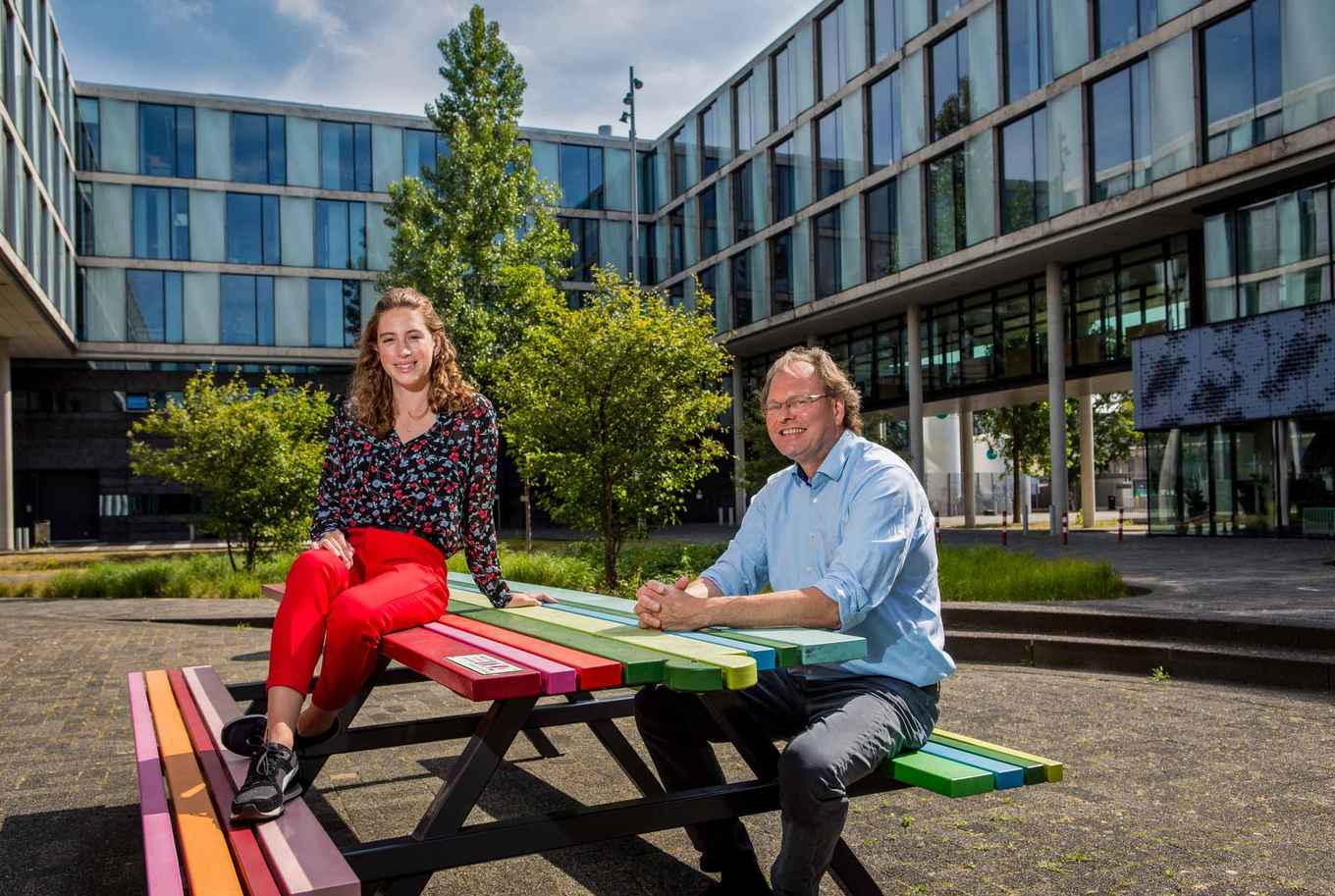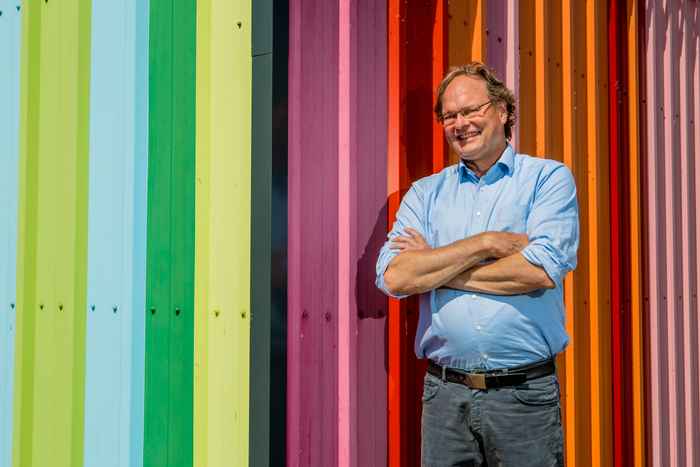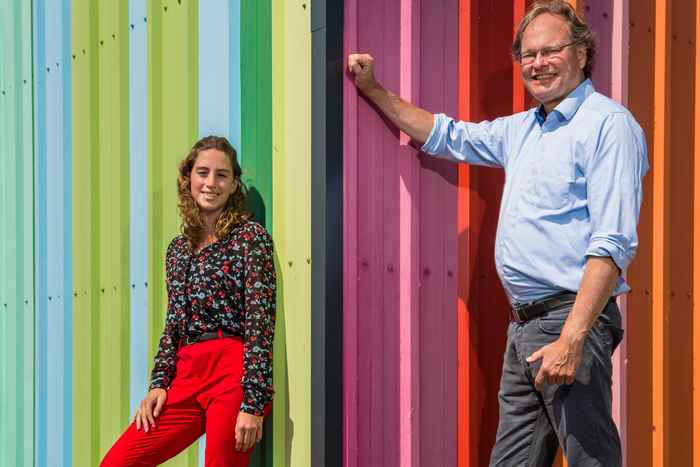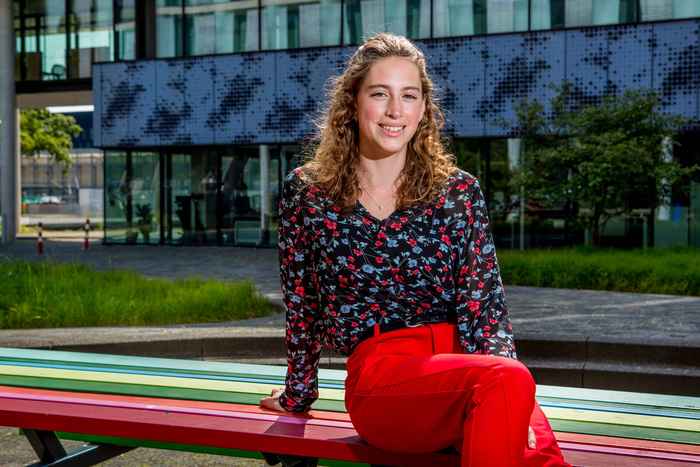20 years Faculty of Science: the past, present and future of Chemistry
30 June 2020

Text: Edda Heinsman. Photography: Liesbeth Dingemans
Something like that is bound to make a person curious, of course, but what is the quarantine etiquette? Is it okay to ask a question about that? It feels a bit like prying; conducting a digital interview like this is still unfamiliar ground. Luckily, Van Diest herself reveals the truth while introducing herself: she was a passionate gymnast, so that explains the trophies!
Talking via Zoom is nothing new for Van Diest and Ingemann. ‘I’ve been teaching online for the last two months, Introduction to Chemistry,’ says Ingemann. ‘I’m starting to get more or less used to it, but I don’t like it. It’s tiring to talk to a screen for an hour and a half.’ Van Diest has taken a few online lectures and is likewise not entirely satisfied. ‘It’s harder to maintain your concentration. It’s more interesting if you’re physically present, so you absorb the material better.’ Ingemann sighs: ‘I may be old-fashioned in this respect, but I can hardly wait to just stand in front of the class again.’

Meeting place
Time for a happier topic: 20 years of the Faculty of Science. What has changed in these two decades? ‘Back then, we were accommodated at the Roeterseiland complex. I still remember it well,’ says Ingemann. His eyes begin to shine. ‘The first time I came to Amsterdam, in 1980, it was to Roeterseiland for my doctoral research project. I have good memories of that time.’ By now, the complex has been completely renovated; Van Diest has been there a few times for exams. Ingemann recalls some memories: ‘Back then, there was a place called the Roetertoeter, a pleasant meeting place and a famous bar for students, and we went for meals at the Chinese restaurant on the corner.’
‘There’s a lot of history at that location. In historical terms, Roeterseiland is the classical spot for the development of chemistry, mostly thanks to the Nobel Prize-winning work by Van 't Hoff, Zeeman and Van der Waals. The building housing the old Van der Waals lab, where the physicist Zeeman worked as well, still exists.’ Ingemann points to the bookcase behind him. Somewhere in one of those books, there should still be an old photo of Van der Waals walking over a bridge at Roeterseiland. ‘But the buildings were worn out, so it was time to move to the new building at the Science Park.’
Only two students
Ingemann does not only have good memories of 20 years of the Faculty of Science. ‘The start was pretty difficult. The numbers of students were terribly low, with the absolute low point in 2001 and 2002. In that period, I gave the lecture on mass spectrometry to just two students, in my office. Things gradually got better with the creation of the Bachelor’s/Master’s structure. Moreover, the curriculum has changed, the degree programme has become broader and there are more electives in the Bachelor’s programme. Besides this, the teaching has improved a lot, which I have invested a lot of effort into. It used to be that the staff were mostly focused on research and didn’t really feel like teaching. Teaching has now become something that people really put their best efforts into.’ Van Diest adds: ‘We’re a small programme; despite this, two of our professors have been proclaimed lecturer of the year at the UvA. They’re all incredibly enthusiastic and they present examples from the research they themselves are working on at the moment, which makes it really interesting.’
The changes within the programme have already borne fruit. Nowadays, Ingemann no longer gives his mass spectrometry lecture to just 2 students, but to more than 90. Has the growth in the student numbers influenced the teaching methods? ‘It’s a huge task!’, says Ingemann. But despite this, he says, the contacts between lecturers and students have actually become more open and more accessible. ‘Lecturers also enjoy having contact with students.’
The Chemistry Master’s at the UvA is particularly popular. ‘The success of this Master’s is, I think, because we offer different types of chemistry, so we have something for everyone. The Analytical Sciences track, for instance, fits in well with the pre-Master’s for students originating from the higher professional education sector, which is where 40% of the intake comes from. Moreover, we offer courses that other universities provide less often, such as within the Molecular Sciences track. And we have yet another flavour: Sustainability and Energy, a shared track with Physics. We attract a relatively large number of international students. And 50 – 60% of the people who do a Master’s here follow this up with a PhD. The Chemistry programme offers good future perspectives.’
Surprisingly fun
Does Van Diest also intend to carry out doctoral research after her current course of studies? ‘I am considering it, yes, but it’ll be a while before my graduation anyway. I’ve decided to do the Master’s in Chemistry, the Molecular Sciences track, to be precise. That was quite a difficult decision, because the programme is very broad and offers a lot of options. In my second year, for instance, I did two projects. One was in the field of heterogeneous catalysis. After having created a number of catalysts that worked poorly, our ultimate catalyst proved so effective that we had to intervene to stop the reaction! It was really interesting. The other project was in computational chemistry – a totally different branch of chemistry and not one that I had chosen myself. Nevertheless, it turned out to be surprisingly fun. Actually, I should be doing my final work placement in Synthetic Organic Chemistry now, but that isn’t possible at the moment due to the coronavirus. I hope I won’t incur too much of a delay because of this.’
Ingemann takes up the thread. He is in a similar situation at the moment of the interview: he does not know precisely how the university will approach the issue of lectures and practical classes that cannot be given online. ‘For the time being, we are not supposed to come to the university in person.’ OK, but can we arrange to come together for the photo? Certainly, but outdoors, with enough distance between us.

